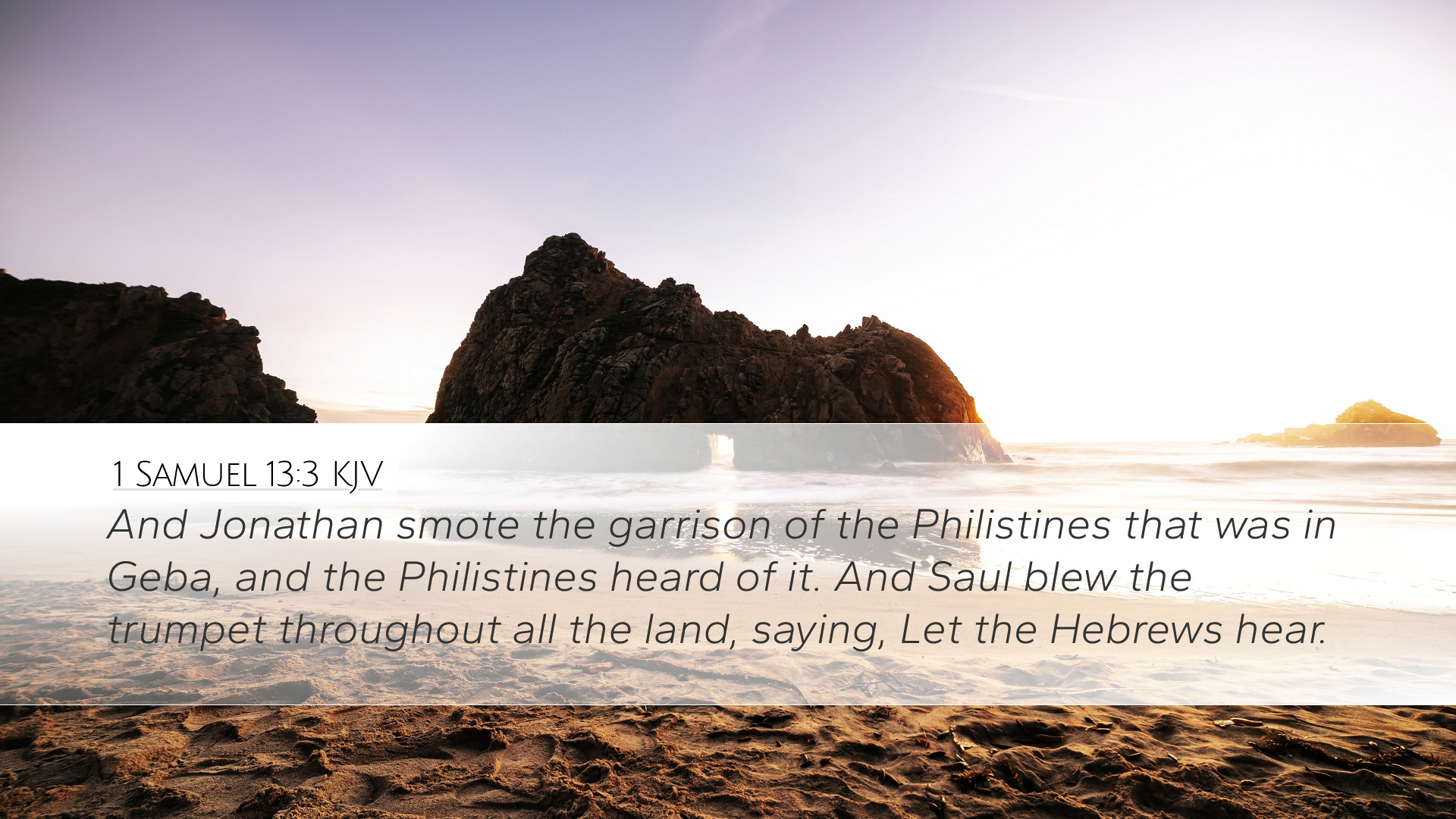Bible Commentary on 1 Samuel 13:3
Verse: "And Jonathan smote the garrison of the Philistines that was in Geba: and the Philistines heard of it. And Saul blew the trumpet throughout all the land, saying, Let the Hebrews hear."
Introduction
This verse marks a crucial moment in the narrative of Israel's struggle against Philistine oppression. Jonathan's bold act of striking the garrison illustrates both the courage of the young prince and the escalating tensions that would ultimately lead to significant developments in Israel's history. In examining this verse, we glean insights from notable public domain commentaries, enriching our understanding of the theological and historical implications at play.
Analysis of Key Elements
1. The Act of Jonathan
Contextual Background: Jonathan's victory is significant within the broader context of Israel's military struggles against the Philistines. Matthew Henry remarks on Jonathan's bravery, highlighting that it was a challenge against the long-standing enemy of Israel. This act not only showcases his leadership qualities but also illustrates a deep sense of duty towards his nation.
Symbol of Leadership and Courage
Albert Barnes emphasizes that Jonathan's act was not merely a military maneuver but also a pivotal declaration of faith and courage. By choosing to confront the Philistines, he sets an example for Israel, symbolizing hope and resilience in the face of overwhelming odds. His defiance against the Philistine garrison serves as a reminder of God's deliverance through faithful leadership.
2. The Philistines' Reaction
Upon hearing of Jonathan's bold strike, the Philistines were alarmed. Adam Clarke notes how the announcement of this act would have incited fear within the enemy ranks, leading to a desire for retaliation. This moment underscores the psychological dimensions of warfare in ancient Israel, where news of victories could instill courage in one’s followers while simultaneously demoralizing the opposition.
Moral Implications of the Encounter
Jonathan’s actions also raise moral questions about warfare and conflict. Matthew Henry posits that Jonathan’s strike, although a military assault, can be seen as a righteous endeavor in the context of liberating Israel from oppression. This highlights that not all conflicts are equally justified, and some acts of violence can stem from a place of divine appointment and necessity.
3. Saul's Response
Saul's response to Jonathan's military action by blowing the trumpet across the land serves several purposes. It acts as both a rallying cry for the Israelites and a method of consolidating power. Albert Barnes interprets this act as Saul’s attempt to unify his people under his leadership. However, the implications of this action go beyond mere trumpet blowing; it is a strategic move to reinforce his authority in light of the recent victory by Jonathan.
The Significance of the Trumpet Call
The blowing of the trumpet symbolizes a call to arms, uniting the Israelites against a common enemy. Adam Clarke further explains that this proclamation is important because it not only communicates a military development but also serves to inspire nationalistic fervor among the Hebrews. Saul's intention is clear: any victory, regardless of who achieved it, would contribute to the overall strength and unity of the nation.
Theological Importance
The theological implications of this passage are profound. It illustrates the idea that God's providence operates through human action. Jonathan's faith in confronting the Philistines can be seen as a reflection of a broader trust in God's plans for Israel. Matthew Henry suggests that God delights to work through those who step out in faith, and Jonathan’s bravery is a testament to this principle.
Faith in Action
This narrative urges readers to consider how they act on their faith. Jonathan does not wait for Saul to command a response; instead, he recognizes the threat and takes immediate action. Albert Barnes points out that faith is characterized by action. This narrative challenges believers to reflect on their readiness to act when confronted with challenges that demand courage and trust in God's provision.
The Role of Divine Sovereignty
The passage encapsulates the continuing theme of divine sovereignty. While Saul, as king, represents human authority, Jonathan's victory alludes to the reality that God often uses unlikely individuals to bring about His purposes. Adam Clarke asserts that this dynamic between human action and divine will is crucial in understanding the broader narrative of Israel's history. It encourages believers to perceive their roles as part of a larger divine plan.
Conclusion
This commentary on 1 Samuel 13:3 offers valuable insights into the themes of courage, leadership, and the interplay between divine sovereignty and human action. Jonathan's audacity in attacking the Philistine garrison and Saul's subsequent trumpet call exemplify the complexities of leadership during tumultuous times. For pastors, students, theologians, and scholars, this passage invites reflection on the nature of faith and the responsibilities that come with leadership. Through the lens of this scripture, we are reminded that divine sovereignty is often manifested through our acts of bravery and discernment in the face of adversity.


